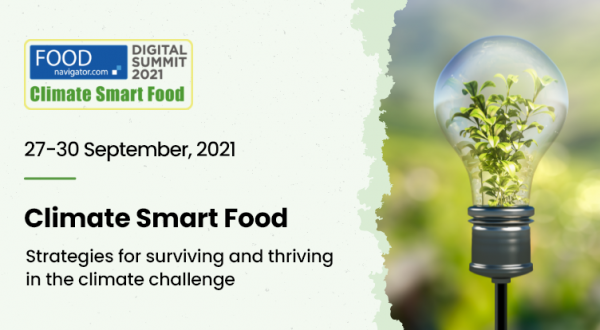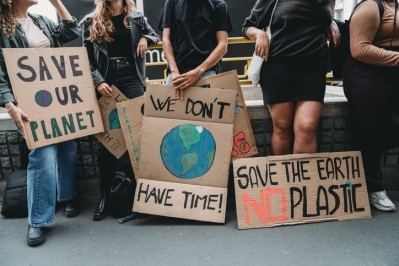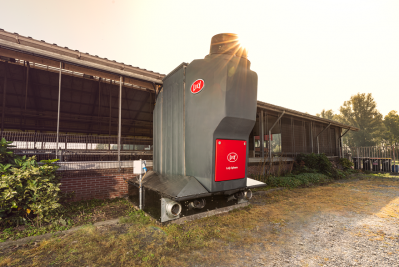FREE BROADCAST EVENT
Climate Smart Food: Striving for sustainable nutrition
This content item was originally published on www.foodnavigator.com, a William Reed online publication.
Food production is responsible for around one-quarter of total greenhouse gas emissions. If global warming is to be limited to 1.5°C above pre-industrial levels - and the catastrophic consequences of a greater increase are to be avoided - the way we produce, process and consume food needs to change.
In FoodNavigator's first Climate Smart Food digital summit, we will ask what this transformation looks like and how it can be achieved. From the action large corporations are taking to combat emissions in their supply chains, through to consumer attitudes to sustainable consumption, and cutting-edge innovation in food and ag tech. The aim is to dig down beyond distant Net Zero ambitions to explore the roadmap to get there.
And, just like finding the climate fix, this isn't a journey we can do alone. We will be joined by more than 50 speakers from a wide variety of stakeholders, including F&B corporates, NGOs and civil society, academics and scientists.
Join the conversation live between 27-30 September, or catch-up on demand, by REGISTERING HERE.
Day 1 (2-5pm CET / 7-10am CST): Supply chain and scope 3
Title | Synopses | Confirmed Speakers |
The global food system transformation | A system-wide transformation of the food sector will be needed if we are to achieve the UN’s SDGs. What would this massive re-think of how we produce food look like? And what role should regulators, civil society and industry take to support this transition? |
|
Deforestation free and beyond: The food industry’s evolving approach to high risk commodities | Pressure is rising for the food sector to wipe-out deforestation from its supply chains. As this goal comes within reach, leaders on deforestation are looking to a forest positive future. Our expert panel weighs in. |
|
Upcycling innovation | Upcycling – the use of production side-streams to create new products – is gaining traction. Innovation in the space offers the opportunity to reduce food waste, boost margins and drive innovation. In a series of elevator pitches, we hear from some of the ground-breaking pioneers in the space. |
|
In conversation with Pascal Chapot, Nestlé’s Group Head of Sustainable Agriculture | In this fireside chat, we will learn more about how the world’s largest food maker is leveraging agriculture to drive impact at scale, its hopes for regenerative agriculture and how it is working with the +500,000 farmers who supply it. |
|
Regenerative Agriculture: Impact and outcomes | Regenerative agriculture is a term that has jumped in popularity. The idea that agriculture can be used to draw carbon from the atmosphere and into the earth - building soil health, boosting yields and improving water resilience in the process – is indeed compelling. But without a clear definition and agreed standards, is there a risk that the concept will be watered down or used to justify business-as-usual? Thought leaders and soil experts weigh in. |
|
Day 2 (2-5pm CET / 7-10am CST): Sustainable consumption I
Title | Synopses | Confirmed Speakers |
In conversation with Gilberto Tomazoni, Global CEO of JBS | Meat production – and beef in particular – is a big contributor to agricultural emissions. The world’s largest meat producer, JBS, has said that it intends to reach net zero in line with the Science Based Targets. In a sector beset by challenges, how can this be achieved? |
|
Putting human rights at the heart of climate justice | A human rights-based approach to the climate crisis is essential to restore vital ecosystem services while fighting food insecurity. However, there remains a lack of recognition about the interconnected nature of environmental protection and human rights. Here's what you need to know. |
|
Transparency with integrity: How Provenance and Princes are leveraging blockchain to bring trust to social impact | This case study looks at how Princes is leveraging blockchain to communicate its sourcing story to consumers in a trustworthy way. Starting with its Napolina brand the company is working in partnership with Provenance, a software solution for sustainability communications, to bring trust to its claims around combating labour abuses in Italian agriculture. |
|
A question of trust: From transparency to carbon labels and greenwashing | Increasingly savvy and sustainability conscious consumers are wary of companies who are suspected of greenwashing. Proponents of environmental labels claim they boost consumer choice and can be leveraged to shift consumption towards lower emission food choices. But will they really live up to this promise? And how can the food sector win consumer trust? What solutions are emerging to give shoppers confidence that the food they eat is ethically and responsibly produced? Is radical traceability and transparency the answer and, if so, how can these stories be told? |
|
Building a carbon neutral brand: Mondelez International and the development of NoCOé | NoCOé was developed by Mondelez International’s SnackFutures, an innovation and investment vehicle that aims to capitalize on emerging trends to build and grow smaller brands with large-scale potential. It is the first cracker brand produced by Mondelez that delivers a carbon neutral snack. Benjamin Pflieger, who leads the brand, will discuss Mondelez’s learnings from developing a carbon neutral brand. |
|
Towards low impact meat and dairy | Animal agriculture is seen as part of the climate problem. But not all meat production models can be judged by the same yardstick. From the importance of grazing rangelands, to mixed agriculture as part of regenerative practices and innovation in feed to cut GHG emissions, we will profile the work being undertaken to move meat and dairy to a low impact footing. |
|
Day 3 (2-5pm CET / 7-10am CST): Sustainable consumption II
Title | Synopses | Confirmed Speakers |
In conversation with Hanneke Faber, President Foods & Refreshments, Unilever | Guided by their 'Sustainable Water Philosophy', Suntory promotes activities to preserve water by understanding the natural cycle of water, promoting environmentally conscious water use, conserving watersheds, and engaging with the local community. The company has developed programs to cultivate groundwater near its production sites called 'Suntory Natural Water Sanctuaries' and is a guiding member of the Alliance for Water Stewardship. |
|
Food waste in focus | One-third of the food we produce is wasted. If food waste was a country, it would be the world’s third largest emitter behind only the USA and China. FAO estimates the true cost of food waste stands at $2.6 trillion a year. At the same time, one in nine people are hungry or undernourished. Food waste stands as an environmental, financial and moral failure of the food system. From farm to fork, what can be done to address it? |
|
Appetite for change: Promoting healthy and sustainable diets | IGD has undertaken extensive consumer research to understand what will support consumers to adopt healthier and more sustainable diets. The results are in: Cost and convenience are key – but consumers resist dramatic lifestyle changes. IGD walks us through how the food industry can support the shift to sustainable consumption. |
|
Innovative approaches to plastics and packaging | In a business-as-usual scenario, the ocean is expected to contain one tonne of plastic for every three tonnes of fish by 2025, and by 2050, more plastics than fish. The world has woken up to the scale of the plastic challenge. But what solutions are on the horizon? And what other packaging materials and challenges is the sector grappling with? We hear from innovators in the space driving cutting-edge packaging development. | |
CASE STUDY 1: Coca-Cola UK Message in a bottle: why 100% rPET will help us achieve our net zero goals |
| |
CASE STUDY 2: Nespresso Expanding circularity of Nespresso packaging |
| |
ELEVATOR PITCHES Three exciting start-ups present their unique and innovative packaging solutions to our expert panel. |
| |
Plant-based potential: Dietary diversification for healthy people and planet | Not all of us are willing to become vegetarian to save the planet. Still fewer are happy to commit to veganism. But innovation in plant-based and the development of analogue products is increasing the sector’s appeal to a broader cross section of society. Will the rise of flexitarianism help move the needle on food sector emissions? |
|
Day 4 (2-5pm CET / 7-10am CST): Innovation for system transformation
Title | Synopses | Confirmed Speakers |
Becoming water positive: Suntory’s innovative approach to water stewardship | As the world heats, water stewardship is an increasingly hot topic. We hear from leading global beverage maker Suntory about its aim to become water positive, its involvement in the Science Based Targets Network’s water pilot study and the group’s innovative approach to natural water sanctuaries. |
|
Ag tech innovation: From precision agriculture to vertical farms | As the agricultural sector works to reduce its carbon footprint, many expect digital developments will play a key role. From precision agriculture, to blockchain and vertical farms, we ask what shape the future of agricultural production might take. |
|
The transformative power of food tech | FTW Ventures is an early stage VC supporting food and ag tech innovators that have the potential to disrupt trillion-dollar markets. Founder Brian Frank outlines the tech and trends he believes will help build a future-fit food system and discusses the role of the investment community in supporting this transition. |
|
Fermenting a sustainable future for food | Biotechnology and fermentation are increasingly viewed as a way the food industry can produce more raw materials without increasing the amount of natural resources needed. Here, we examine how biotech innovators are leveraging cutting-edge science to tackle one of the huge challenges of feeding the growing global population within finite planetary resources. |
|
Bringing lab meat to market | With the first regulatory hurdles for cultured meat already overcome and investment levels continuing to rise, we ask the crucial question facing the sector: What is the path to market for cultured meat? |
|









